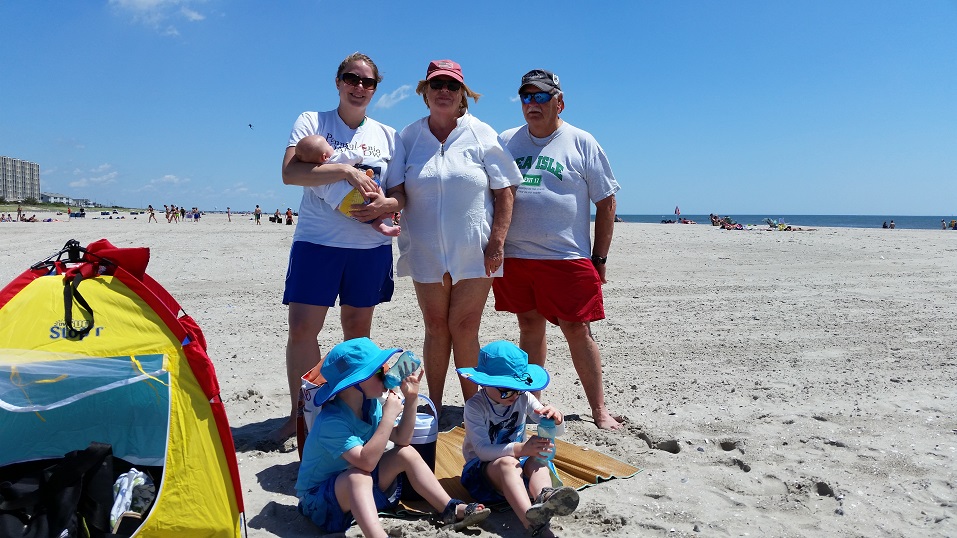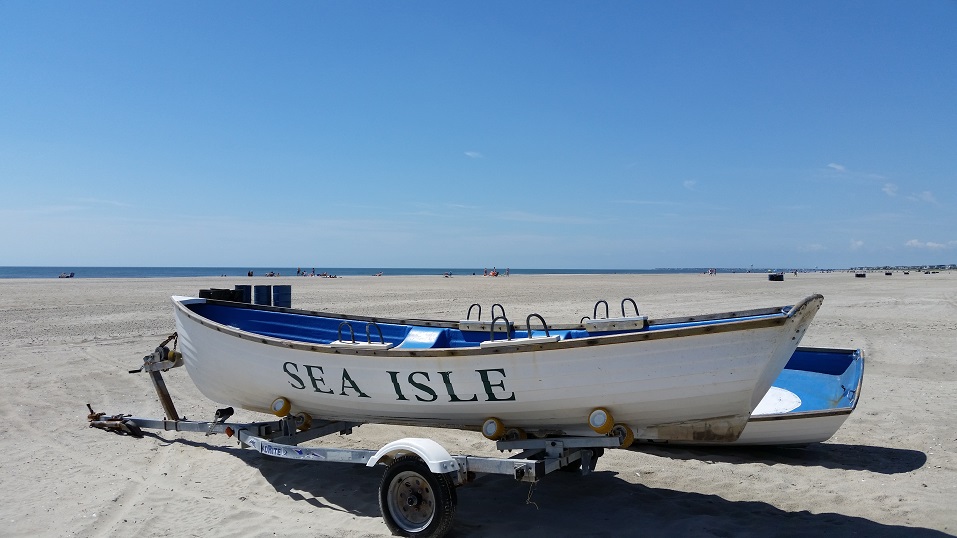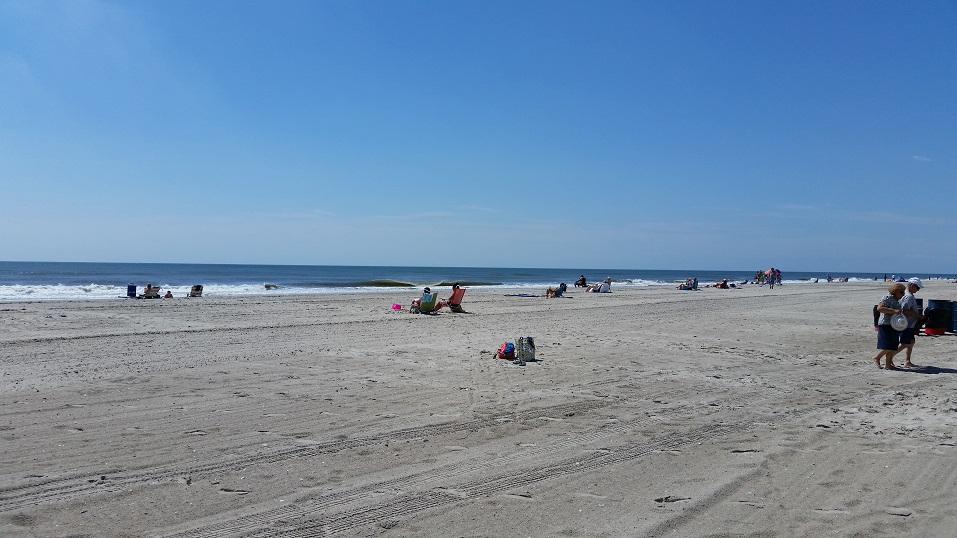
By Donald Wittkowski
The Scull family had a large umbrella, a small tent, some chairs, towels, plastic shovels, buckets and a few other odds and ends. But most important, they had a beach – plenty of deep, powdery sand stretching about 300 feet wide.
On a gorgeous, sun-splashed day, Charles and Kathleen Scull, their daughter-in-law Erika Kutsch and grandsons Austin, Deklan and Kaden basked on a section of what is now Sea Isle City’s expansive beachfront.
Just in time for the arrival of the summer season, the beaches have been replenished along the city’s entire 4 1/2-mile coastline from First Street to 94th Street at Townsends Inlet.
The Sculls, who have a summer home on Sounds Avenue, recalled how some powerful coastal storms in the fall and winter had robbed Sea Isle of much of its precious sand, leaving the beachfront looking a bit bare.
“It was just so narrow then. At high tide, we were sitting up there because the water was coming up,” Kathleen Scull said, pointing to a spot near the dunes. “Now, the beach is much wider. They’ve done a great job.”
Gazing at his grandchildren, Charles Scull stressed the importance of having attractive beaches for a family-friendly atmosphere.
“It’s great for the kids,” he said. “It’s a family place. It’s nice.”
Sea Isle benefited from a $90 million beach replenishment project, funded by the U.S. Army Corps of Engineers, that also included new sand for Ocean City and the Strathmere section of Upper Township. Sea Isle’s $40 million share was the biggest part among the three towns, said George Savastano, the city’s business administrator.
Beach replenishment actually was a two-part project. Originally, Sea Isle’s shoreline was restored with roughly 2 million cubic yards of sand. An extra 900,000 cubic yards were added after an October coastal storm and the powerful January nor’easter named Jonas caused severe erosion, Savastano said.
Jonas, which pummeled the Jersey Shore with strong winds and extensive tidal flooding, left Sea Isle with narrow beaches and cliff-like drop-offs in the dunes between 6 and 8 feet high.
Savastano said some stretches of beach were just 50 feet wide after Jonas. But now, the replenished beachfront stretches about 300 feet across in some areas.

A lifeguard boat sits high and dry on the big beach at 45th Street.
Sea Isle’s initial replenishment project widened the beaches between 100 and 200 feet, but the second stage, prompted by damage from Jonas, saw the Army Corps of Engineers add an extra 100 feet of sand between 30th and 54th streets, Savastano explained.
“When we refilled, we made the beaches wider than the original design,” he said. “We realized that the downtown beaches should have been built a little wider. The decision was made to do that after Jonas.”
Just like with other shore towns, the beaches are the top attraction for Sea Isle’s tourist-based economy. Combined with the dunes, the beaches also provide a protective buffer against coastal storms.
“We have nice, wide beaches for recreational purposes and healthy dunes to help with shore protection,” Savastano said.
Savastano has deep insight about the importance of beach replenishment projects because he formerly served as an engineer for the Army Corps of Engineers. He oversaw major beach restoration projects in Cape May and Ocean City in the early 1990s.
Savastano noted that Sea Isle formerly used a “Band-Aid approach” toward maintaining its beaches. A series of smaller beach restoration projects were done in partnership with the state of New Jersey in recent years.
However, the city’s new tip-to-tip beach replenishment was part of a 50-year program by the Army Corps of Engineers. The new sand is supposed to last for five years before the beaches are restored again, but Savastano acknowledged that the Jersey Shore’s capricious coastal storms could upset that timetable.
The beach replenishment project was paid entirely by the federal government through the Army Corps of Engineers. The funding formula for future projects calls for the federal government to pay 50 percent of the cost, the state 37.5 percent and Sea Isle the remaining 12.5 percent, Savastano said.
He characterized it as well worth the cost, particularly in view of the role that wide, beautiful beaches play in Sea Isle’s tourist-dependent economy.

Sunbathers now have plenty of room to stretch out on Sea Isle's restored shoreline.
“The No. 1 attraction for Sea Isle, just like with other barrier islands in the area, is our beaches,” Savastano said. “Having a clean, well-maintained beach that is easily accessible is key. We take pride in making sure that our beaches are all of those things.”
The replenished beaches were a crucial part of Sea Isle’s successful Memorial Day weekend, the unofficial start of the summer tourism season, City Council President Jack Gibson said.
“We had a tremendous number of people on our new beaches,” Gibson said during Council’s May 31 meeting. He added, “The people love us. They’ll be here again when the weather is great.”
Sea Isle devotees Robin Frullo and Tracy Turner marveled at the city’s restored coastline during a recent outing at the beach off John F. Kennedy Boulevard.
“It’s an awesome beach. It’s great,” exclaimed Frullo, who owns a house on 40th Street.
Turner, Frullo’s friend from Audubon N.J., said she was anxious to see the restored beaches.
“They were so small before. It was jam-packed. Now, there is much more room,” Turner said.

 Sunbathers now have plenty of room to stretch out on Sea Isle's restored shoreline.
“The No. 1 attraction for Sea Isle, just like with other barrier islands in the area, is our beaches,” Savastano said. “Having a clean, well-maintained beach that is easily accessible is key. We take pride in making sure that our beaches are all of those things.”
The replenished beaches were a crucial part of Sea Isle’s successful Memorial Day weekend, the unofficial start of the summer tourism season, City Council President Jack Gibson said.
“We had a tremendous number of people on our new beaches,” Gibson said during Council’s May 31 meeting. He added, “The people love us. They’ll be here again when the weather is great.”
Sea Isle devotees Robin Frullo and Tracy Turner marveled at the city’s restored coastline during a recent outing at the beach off John F. Kennedy Boulevard.
“It’s an awesome beach. It’s great,” exclaimed Frullo, who owns a house on 40th Street.
Turner, Frullo’s friend from Audubon N.J., said she was anxious to see the restored beaches.
“They were so small before. It was jam-packed. Now, there is much more room,” Turner said.
Sunbathers now have plenty of room to stretch out on Sea Isle's restored shoreline.
“The No. 1 attraction for Sea Isle, just like with other barrier islands in the area, is our beaches,” Savastano said. “Having a clean, well-maintained beach that is easily accessible is key. We take pride in making sure that our beaches are all of those things.”
The replenished beaches were a crucial part of Sea Isle’s successful Memorial Day weekend, the unofficial start of the summer tourism season, City Council President Jack Gibson said.
“We had a tremendous number of people on our new beaches,” Gibson said during Council’s May 31 meeting. He added, “The people love us. They’ll be here again when the weather is great.”
Sea Isle devotees Robin Frullo and Tracy Turner marveled at the city’s restored coastline during a recent outing at the beach off John F. Kennedy Boulevard.
“It’s an awesome beach. It’s great,” exclaimed Frullo, who owns a house on 40th Street.
Turner, Frullo’s friend from Audubon N.J., said she was anxious to see the restored beaches.
“They were so small before. It was jam-packed. Now, there is much more room,” Turner said.